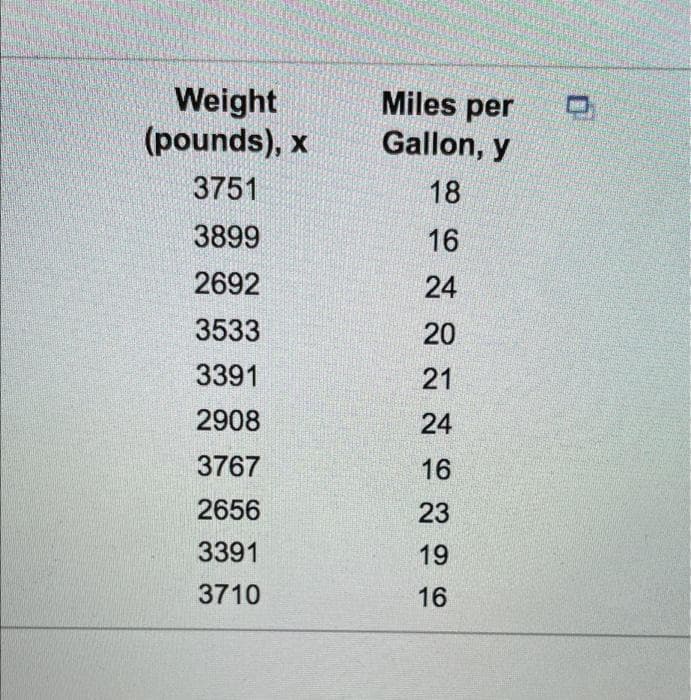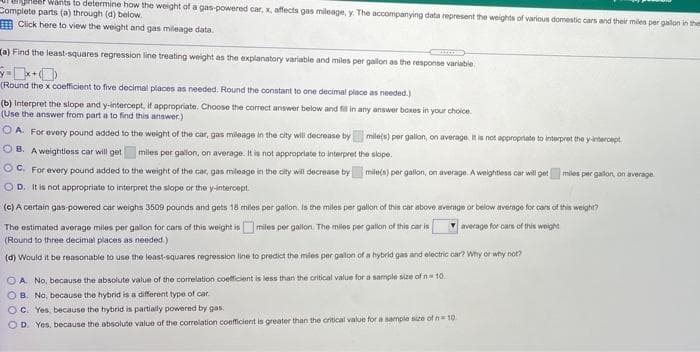a) Find the least-squares regression line treating weight as the explanatory variable and miles per galon as the response variable Round the x coefficient to five decimal places as needed. Round the constant to one decimal place as needed.) b) Interpret the slope and y-intercept, if appropriate. Choose the correct answer below and fil in any answer boxes in your choice. Use the answer from part a to find this answer.) O A. For every pound added to the welght of the car, gas mileage in the city will decrease by mile(s) per galon, on average. Iit is not appropriate to interpret the y-interoept. OB. Aweightless car will get miles per galon, on average. It is not appropriate to interpret the slope. OC. For every pound added to the weight of the car, gas mleage in the city will decrease by mile(s) per gallon, on average. A weightless car will get miles per galon, on average O D. It is not appropriate to interpret the slope or the y-intercept. (c) A certain gas-powered car weighs 3509 pounds and gets 18 miles per gallon. Is the miles per gallon of this car above avernge or below average for cars of this weight? The estimated average miles per galon for cars of this weight ismiles per gallon. The milee per gallon of this car is (Round to three decimal places as needed.) average for cars of thvis weight
a) Find the least-squares regression line treating weight as the explanatory variable and miles per galon as the response variable Round the x coefficient to five decimal places as needed. Round the constant to one decimal place as needed.) b) Interpret the slope and y-intercept, if appropriate. Choose the correct answer below and fil in any answer boxes in your choice. Use the answer from part a to find this answer.) O A. For every pound added to the welght of the car, gas mileage in the city will decrease by mile(s) per galon, on average. Iit is not appropriate to interpret the y-interoept. OB. Aweightless car will get miles per galon, on average. It is not appropriate to interpret the slope. OC. For every pound added to the weight of the car, gas mleage in the city will decrease by mile(s) per gallon, on average. A weightless car will get miles per galon, on average O D. It is not appropriate to interpret the slope or the y-intercept. (c) A certain gas-powered car weighs 3509 pounds and gets 18 miles per gallon. Is the miles per gallon of this car above avernge or below average for cars of this weight? The estimated average miles per galon for cars of this weight ismiles per gallon. The milee per gallon of this car is (Round to three decimal places as needed.) average for cars of thvis weight
Elementary Linear Algebra (MindTap Course List)
8th Edition
ISBN:9781305658004
Author:Ron Larson
Publisher:Ron Larson
Chapter2: Matrices
Section2.CR: Review Exercises
Problem 90CR
Related questions
Question

Transcribed Image Text:Weight
(pounds), x
Miles per
Gallon, y
3751
18
3899
16
2692
24
3533
20
3391
21
2908
24
3767
16
2656
23
3391
19
3710
16

Transcribed Image Text:Dpheer wants to determine how the weight of a gas-powered car, x, affects gas mileage, y. The accompanying data represent the weights of various domestic cars and their miles per galon in the
Complete parts (a) through (d) below.
I Click here to view the weight and gas mileage data.
(a) Find the least-squares regression line treating weight as the explanatory variable and miles per gallon as the response variable.
(Round the x coefficient to five decimal places as needed. Round the constant to one decimal place as needed.)
(b) Interpret the slope and y-intercept, if appropriate. Choose the corect answer below and fil in any answer boxes in your choice
(Use the answer from part a to find this answer.)
O A. For every pound added to the weight of the car, gas mileage in the city will decrease by mile(s) per gallon, on average. it is not appropriate to interpret the yintercept.
O B. Aweightless car will get
miles per gallon, on average. It is not appropriate to interpret the slope.
O C. For every pound added to the weight of the car, gas mileage in the city will decrease by
mile(s) per gallon, on average. A weightless car will get miles per galon, on average
O D. It is not appropriate to interpret the slope or the y-intercept.
(c) A certain gas-powered car weighs 3509 pounds and gets 18 miles per gallon. Is the miles per galon of this car above avenage or below average for cars of this weight?
The estimated average miles per gallon for cars of this weight isOmiles per gallon. The miles per galion of this car isYaverage for cars of this weight
(Round to three decimal places as needed. )
(d) Would it be reasonable to use the least-squares regression line to predict the mies per galon of a hybrid gas and electric car? Why or why not?
O A. No, because the absolute value of the correlation coefficient is less than the critical value for a sample size of n 10.
OB. No, because the hybrid is a different type of car.
O C. Yes, because the hybrid is partially powered by gas.
O D. Yes, because the absolute value of the correlation coefficient is greater than the critical value for a sample size of n10
Expert Solution
This question has been solved!
Explore an expertly crafted, step-by-step solution for a thorough understanding of key concepts.
This is a popular solution!
Trending now
This is a popular solution!
Step by step
Solved in 4 steps

Recommended textbooks for you

Elementary Linear Algebra (MindTap Course List)
Algebra
ISBN:
9781305658004
Author:
Ron Larson
Publisher:
Cengage Learning

Linear Algebra: A Modern Introduction
Algebra
ISBN:
9781285463247
Author:
David Poole
Publisher:
Cengage Learning

Glencoe Algebra 1, Student Edition, 9780079039897…
Algebra
ISBN:
9780079039897
Author:
Carter
Publisher:
McGraw Hill

Elementary Linear Algebra (MindTap Course List)
Algebra
ISBN:
9781305658004
Author:
Ron Larson
Publisher:
Cengage Learning

Linear Algebra: A Modern Introduction
Algebra
ISBN:
9781285463247
Author:
David Poole
Publisher:
Cengage Learning

Glencoe Algebra 1, Student Edition, 9780079039897…
Algebra
ISBN:
9780079039897
Author:
Carter
Publisher:
McGraw Hill